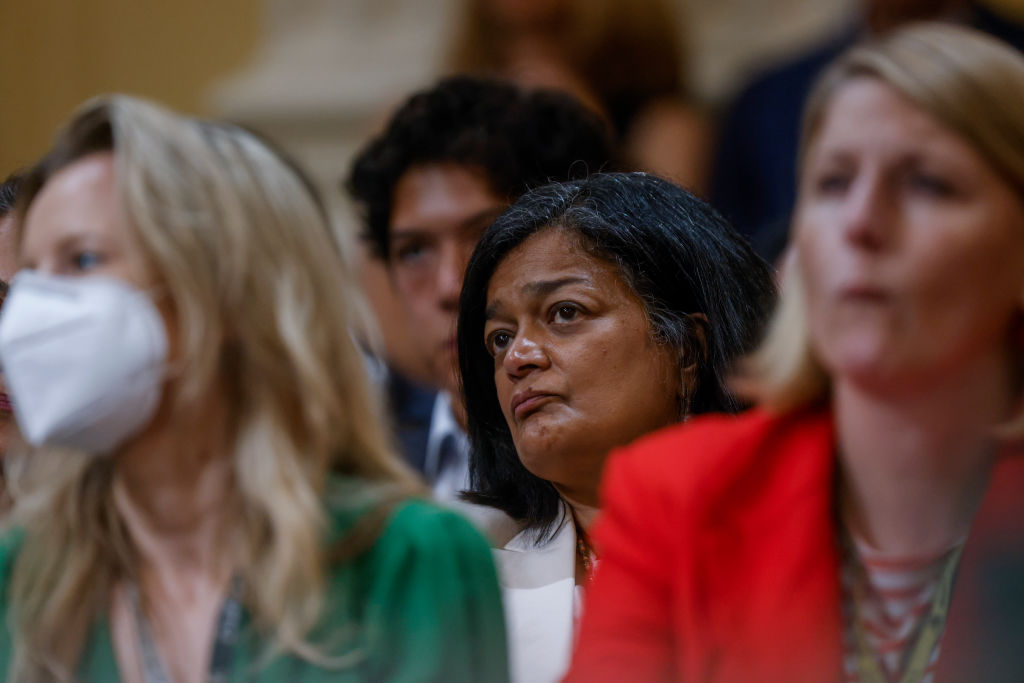
This article is part of The D.C. Brief, TIME’s politics newsletter. Sign up here to get stories like this sent to your inbox.
Back in the hazy days of summer, the idea of progressives sending a stern letter to the White House urging a return to the negotiating table for all of the parties witnessing bombs fall from the skies over Ukraine probably made sense. The destruction of that country wasn’t easy to watch, the trucks of money being shipped to Kyiv were getting tougher to sell, and foreign policy wasn’t exactly helping liberals defend their slimmest of majorities. The call to consider “redoubling efforts to seek a realistic framework for a ceasefire” wasn’t especially incendiary, even if it did hint at appeasement.
But what made sense in June and July may not ring as true in October. In the last 72 hours, that note, released on Monday, apparently months after some signers agreed to support an earlier draft and obviously in error, has become an exemplar of dissent inside the Democratic caucus that hints at a nascent fight poised to explode after the November elections. And it signifies just what lack of unity remains as Democrats hit their final two weeks of campaigning amid an economy that is alternatively one of the strongest in decades with record-low unemployment and weak with inflation rocketing quicker than Washington can chase.
So some facts are in order to start us. Russia invaded Ukraine, claiming an effort to restore culturally Russian lands and repair the vestiges of an empire. Ukrainians had other thoughts and held back a Cold War-era military. Americans largely stood behind Russia, although some of Donald Trump’s acolytes in the Republican Party thought U.S. support for Kyiv might be misguided; their pals at Fox News and in the conservative echo chamber amplified that idea. Republican Leader Kevin McCarthy—perhaps the next Speaker of the House—has suggested a GOP-controlled House would no longer back a so-called blank check for Ukrainian aid.
The letter from House progressives came on the heels of McCarthy’s warning, but also as Ukraine has seen some success in beating back the Russian offensive. Back over the summer, the prospect of encouraging a ceasefire wasn’t particularly forceful or novel. Fast-forward a few months and suddenly, it’s a message far more out of step with much of Washington and the country. Some of the 30 progressive signatories to that diplomatic letter have since said they wouldn’t have signed the letter today, given the new dynamics.
“The letter was drafted several months ago, but unfortunately was released by staff without vetting,” Rep. Pramila Jayapal, the chair of the Congressional Progressive Caucus, said in a statement explaining why she was retracting the letter.
So what really happened?
Well, the letter sat gathering dust. And then it showed up without warning. Lawmakers were caught by surprise, and had little choice but to have the Congressional Progressive Caucus’ back, or to turn tail. And it quickly became apparent that the perception of coddling Russia was far less appealing in October than it may have been in June. Americans’ tolerance for the ongoing fight has grown, and it’s become politically advantageous to cheer on the Ukrainians.
The election season that is nearing its climax is far from one to hinge on the situation in Ukraine or U.S. policy toward it. But a disjointed Democratic posture toward the leading foreign policy issue of the day is far to be an advantage for the party fighting for survival. The infighting is a distraction. And, once again, Democrats found a way to add trouble where plenty already existed.
Make sense of what matters in Washington. Sign up for the D.C. Brief newsletter.
More Must-Reads From TIME
- The 100 Most Influential People of 2024
- How Far Trump Would Go
- Scenes From Pro-Palestinian Encampments Across U.S. Universities
- Saving Seconds Is Better Than Hours
- Why Your Breakfast Should Start with a Vegetable
- 6 Compliments That Land Every Time
- Welcome to the Golden Age of Ryan Gosling
- Want Weekly Recs on What to Watch, Read, and More? Sign Up for Worth Your Time
Write to Philip Elliott at philip.elliott@time.com